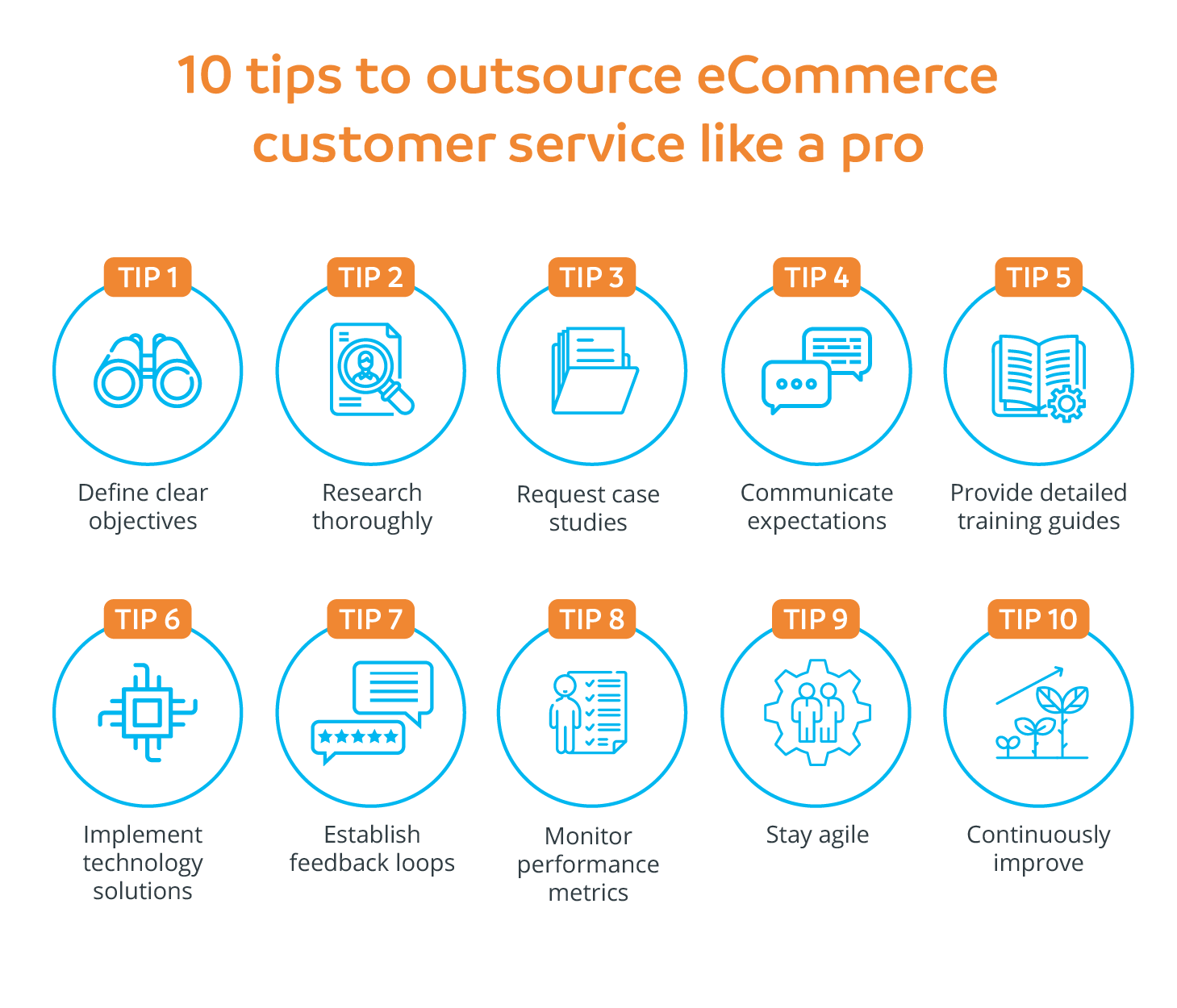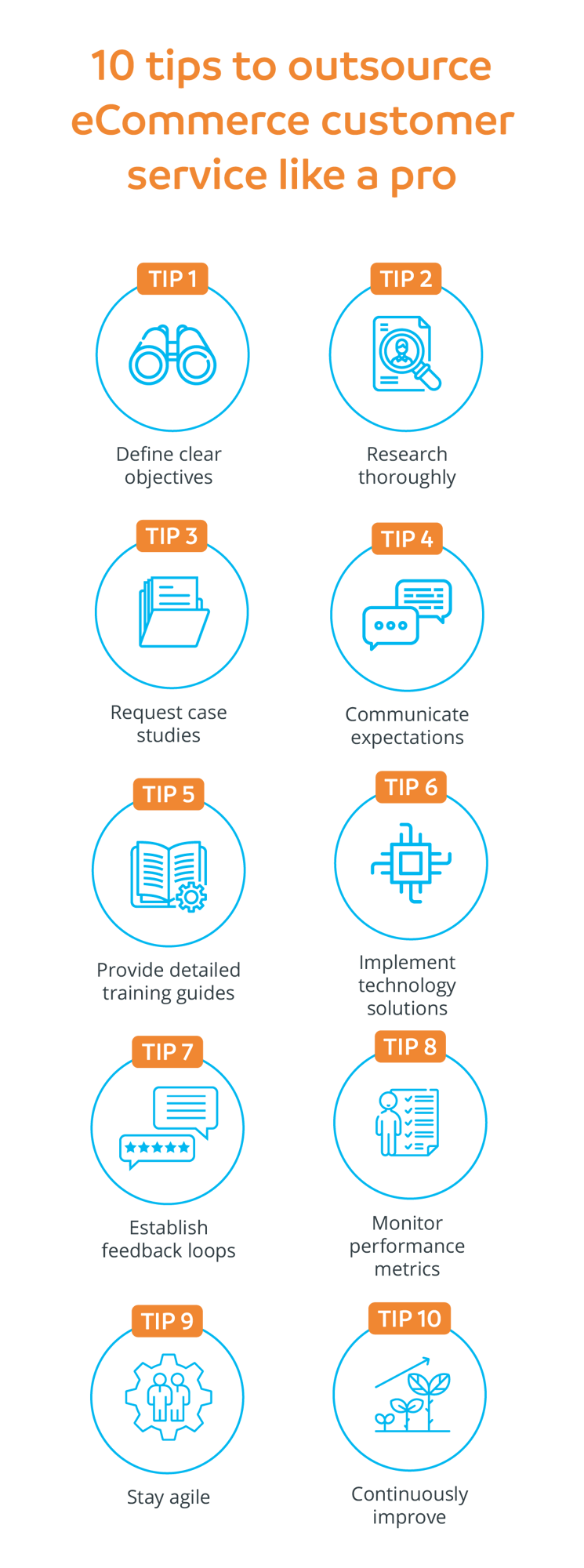10 tips for eCommerce customer service outsourcing

In this blog, these two facts are all you need to consider: by 2026, 24% of retail purchases are expected to take place online1 and 47% of businesses outsource to acquire access to scalable resources2. Simply put, businesses with an online presence or those aiming to tap into the eCommerce market must develop a strategy to keep up with the industry's expected growth. Outsourcing your customer service eCommerce functions is a great place to start…
What is eCommerce customer service outsourcing?
eCommerce customer service outsourcing involves partnering with third-party service providers to handle various aspects of customer support and interaction. These companies have the know-how, the tech tools and the smooth processes to take care of everything from answering customer questions to managing orders. It's like having a trusted partner who handles all the nitty-gritty customer stuff while you focus on running your eCommerce business smoothly.
Why should you outsource customer service?
Outsourcing offers businesses a strategic advantage by enabling them to streamline operations, reduce costs and enhance customer satisfaction. 52% of eCommerce customer service teams operate from Monday to Friday, with only 12% available around the clock3. With eCommerce fronts essentially acting as a 24/7 store, offshore teams can fill the gap while saving up to 70% on employment costs. With access to specialized expertise, outsourcing allows businesses to focus on core activities, leverage advanced technologies and provide exceptional customer experiences, ultimately driving growth and competitiveness in the dynamic eCommerce landscape.
Customer service roles you can outsource in eCommerce
Outsource customer service roles like inbound support, order processing technical assistance to free up your time for core business tasks. Here are a list of the most commonly outsourced eCommerce tasks:
- Inbound customer support: handling incoming customer inquiries via multiple channels like phone, email, live chat and social media. With a dedicated team managing inbound queries, businesses can ensure prompt and personalized responses, leading to higher customer satisfaction.
- Order processing: managing order placement, tracking, cancellations and returns. Outsourcing order processing tasks ensures accuracy and efficiency, allowing businesses to focus on product development and marketing strategies.
- Technical support: assisting customers with technical issues related to products or services. By outsourcing technical support, businesses can provide specialized assistance, reducing customer frustration and enhancing brand reputation.
- Billing and payment support: handling billing inquiries, payment processing and resolving payment-related issues. Outsourcing billing and payment support tasks ensures smooth transactions and minimizes payment-related disputes.
- Social media management: monitoring and engaging with customers on social media platforms to address queries and concerns. Outsourcing social media management ensures timely responses and maintains a positive brand image across digital channels.
- Email management: Managing email correspondence, including responding to inquiries, resolving issues and handling escalations. Outsourcing email management tasks allows businesses to efficiently handle large volumes of customer communication while ensuring timely responses.
- Product information and recommendations: Providing detailed product information, specifications, and recommendations to help customers make informed purchasing decisions. Outsourcing product information tasks ensures accurate and up-to-date product data, facilitating a seamless shopping experience for customers.
- Post-purchase support: Assisting customers with post-purchase queries, such as product usage, troubleshooting and warranty claims. Outsourcing post-purchase support tasks enhances customer satisfaction and loyalty by providing comprehensive assistance throughout the customer journey.
- Feedback management: Collecting and analyzing customer feedback to improve products, services, and overall customer experience. Outsourcing feedback management tasks enables businesses to gather valuable insights and implement strategic improvements based on customer preferences and suggestions.
While customer service may be the focus here, it's important to recognize that there's a wealth of other roles perfectly suited to an offshoring. From accounting, marketing, and technical support to data management, software development, and human resources, companies are increasingly leveraging offshore support for various specialized tasks.
10 tips to outsource your eCommerce customer service like a pro
Key tips for successful eCommerce outsourcing include defining clear objectives, choosing the right partner, comprehensive training, and ensuring brand consistency. Ready to supercharge your eCommerce customer service? Here are 10 personal tips straight from our experts:


- Tip 1: Define clear objectives
Take the time to define specific, measurable and achievable objectives for outsourcing your eCommerce customer service functions. For example, you might aim to reduce response times to customer inquiries by 20% within the first three months of outsourcing. Ensure that these objectives align with your overall business goals and priorities, such as improving customer satisfaction scores or increasing operational efficiency. Most importantly, make sure to communicate these objectives with potential or existing outsourcing providers; do they have the resources to achieve these goals?
- Tip 2: Research thoroughly
Conduct thorough research to identify potential outsourcing partners that specialize in eCommerce customer service. Evaluate each potential partner based on factors such as industry experience, client testimonials and service offerings. Consider reaching out to other businesses or industry contacts for recommendations and insights into their experiences with outsourcing partners.
- Tip 3: Request case studies
Request case studies or examples of past projects from potential outsourcing partners to assess their capabilities and track record. Look for case studies that demonstrate success in similar projects or industries, showcasing the partner's expertise and ability to deliver results.
- Tip 4: Communicate expectations
Clearly communicate your expectations to the outsourcing partner, including service level agreements (SLAs), response times, quality standards and any specific requirements unique to your business. Set clear guidelines for communication channels, escalation procedures and handling of sensitive customer issues to ensure alignment and accountability.
- Tip 5: Provide detailed training guides
Develop comprehensive training materials that cover your products, services, brand voice, customer service protocols and any relevant policies or procedures. Conduct thorough onboarding sessions to familiarize the outsourcing team with your brand, products and customer service processes. Offer ongoing training and support to address any gaps in knowledge or skills and keep the outsourcing team up-to-date on changes or updates.
- Tip 6: Implement technology solutions
Invest in technology solutions such as customer relationship management (CRM) systems, ticketing platforms, chatbots and analytics tools to streamline communication and optimize customer service processes. Ensure that the outsourcing partner has access to the necessary technology and resources to effectively manage customer inquiries, track performance metrics and provide timely and accurate support.
- Tip 7: Establish feedback loops
Set up regular feedback sessions with the outsourcing partner to review performance, address any issues or concerns and identify opportunities for improvement. Encourage open and honest communication, and be receptive to feedback from the outsourcing team regarding process efficiency, customer satisfaction and areas for optimization.
- Tip 8: Monitor performance metrics
Track key performance indicators (KPIs) such as response times, resolution rates, customer satisfaction scores and first contact resolution to measure the effectiveness of the outsourcing arrangement. Use performance data to identify trends, pinpoint areas for improvement and make data-driven decisions to optimize customer service operations.
- Tip 9: Stay agile
Remain flexible and adaptable to changes in customer needs, market trends and business priorities. Be prepared to adjust strategies, workflows and resources as needed to address emerging challenges, seize opportunities and optimize results.
- Tip 10: Continuously improve
Foster a culture of continuous improvement within your organization and with the outsourcing partner. Regularly evaluate the outsourcing partnership, gather feedback from stakeholders and implement process improvements to drive ongoing success and efficiency in your eCommerce customer service operations.
Is the Philippines a top eCommerce customer service offshoring destination?
The Philippines boasts a leading position in business process outsourcing (BPO), contributing 9% to its GDP 4. With potential labor cost savings of up to 70%5, outsourcing eCommerce customer service to the Philippines offers a compelling advantage. Coupled with a skilled English-speaking workforce and timezone compatibility with Western markets, businesses can ensure round-the-clock support and faster response times.
Popular posts
Related Posts
Strategies for ensuring data security in eCommerce
There is a lot to like about running an eCommerce business. Low overheads, unrestricted opening hours and the potential for a global customer base..
How outsourcing is helping deliver retail and eCommerce success
Few sectors ride the economic roller-coaster quite like the retail industry. From the impact of inflation and cost-of-living pressures to the rise of..
Why outsourcing in retail is a winning strategy
Not so long ago, ‘Big Four’ accounting firm Deloitte accepted the challenge of checking the pulse of the retail sector. Having shown remarkable..



